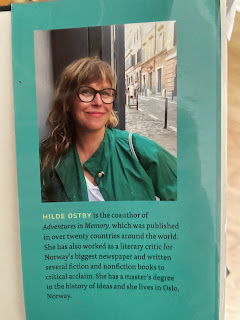 |
| Inge and Peter in 1942 or 1943 |
The toddler was my half-brother, Peter, oldest son of my father’s first family. Peter died at the end of the war, presumably of hunger. Ingrid, or Inge, as she was called, had been visiting little Peter and his mom because her own mother, my dad’s sister known to me as Tante Anni, was heading to Stalingrad to visit her dying husband—too wounded to make the trip back to Germany. That’s why “Der Arzt von Stalingrad” must have been in my dad’s library and that’s also why the once popular book, first published in 1958, is now on my summer reading list. Here's a link to a curious and very dated movie trailer made in 1958. A memory of the horror of war.
 |
| Inge and me in 2019 |
As the people directly affected by the Second World War fade from us, taking their memories with them, it’s only through stories that old photos come alive. Knowing that Cousin Inge once played with my half-brother, Peter, makes him a real person for me and gives credence to the heartbreak my father must have known. It also gives me the motivation to keep writing.
Rest in peace, cousin Ingrid.







